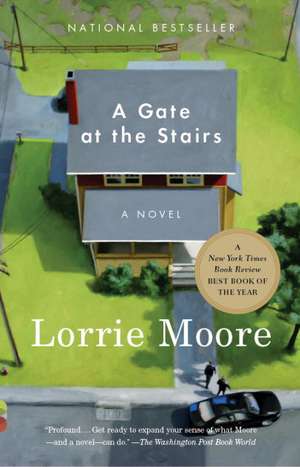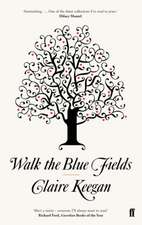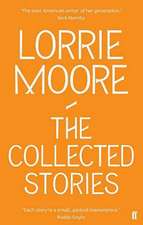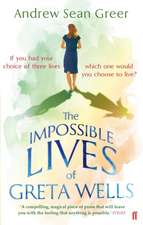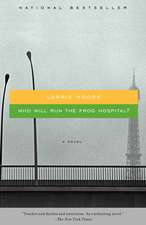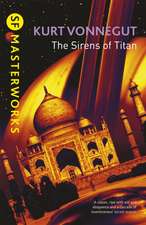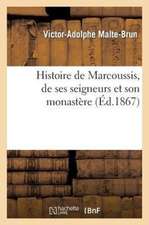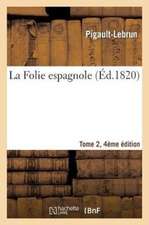A Gate at the Stairs
Autor Lorrie Mooreen Limba Engleză Paperback – 31 iul 2010
Vezi toate premiile Carte premiată
PEN/Faulkner Award (2010), Baileys Women's Prize for Fiction (2010), Midwest Booksellers' Choice Award (2010)
Finalist for the Orange Prize for Fiction
Chosen as a Best Book of the Year by The New York Times Book Review, The Washington Post, Chicago Tribune, The Christian Science Monitor, Kansas City Star, Financial Times, St. Louis Post-Dispatch, and Real Simple
Twenty-year-old Tassie Keltjin, the daughter of a gentleman farmer, has come to a university town as a student. When she takes a job as a part-time nanny for a mysterious and glamorous family, she finds herself drawn deeper into their world and forever changed. Told through the eyes of this memorable narrator, A Gate at the Stairs is a piercing novel of race, class, love, and war in America.
Preț: 92.18 lei
Nou
Puncte Express: 138
Preț estimativ în valută:
17.64€ • 19.17$ • 14.83£
17.64€ • 19.17$ • 14.83£
Carte indisponibilă temporar
Doresc să fiu notificat când acest titlu va fi disponibil:
Se trimite...
Preluare comenzi: 021 569.72.76
Specificații
ISBN-13: 9780375708466
ISBN-10: 0375708464
Pagini: 321
Dimensiuni: 134 x 201 x 19 mm
Greutate: 0.25 kg
Editura: Vintage Books USA
ISBN-10: 0375708464
Pagini: 321
Dimensiuni: 134 x 201 x 19 mm
Greutate: 0.25 kg
Editura: Vintage Books USA
Notă biografică
Lorrie Moore is the author of the story collections Birds of America, Like Life, and Self-Help and the novels Who Will Run the Frog Hospital? and Anagrams. Her work has won honors from the Lannan Foundation and the American Academy of Arts and Letters, as well as the Irish Times International Prize for Fiction, the Rea Award for the Short Story, and the PEN/Malamud Award. She is a professor of English at the University of Wisconsin in Madison.
Extras
I
The cold came late that fall and the songbirds were caught off guard. By the time the snow and wind began in earnest, too many had been suckered into staying, and instead of flying south, instead of already having flown south, they were huddled in people’s yards, their feathers puffed for some modicum of warmth. I was looking for a job. I was a student and needed babysitting work, and so I would walk from interview to interview in these attractive but wintry neighborhoods, the eerie multitudes of robins pecking at the frozen ground, dun-gray and stricken—though what bird in the best of circumstances does not look a little stricken—until at last, late in my search, at the end of a week, startlingly, the birds had disappeared. I did not want to think about what had happened to them. Or rather, that is an expression—of politeness, a false promise of delicacy—for in fact I wondered about them all the time: imagining them dead, in stunning heaps in some killing cornfield outside of town, or dropped from the sky in twos and threes for miles down along the Illinois state line.
I was looking in December for work that would begin at the start of the January term. I’d finished my exams and was answering ads from the student job board, ones for “childcare provider.” I liked children—I did!—or rather, I liked them OK. They were sometimes interesting. I admired their stamina and candor. And I was good with them in that I could make funny faces at the babies and with the older children teach them card tricks and speak in the theatrically sarcastic tones that disarmed and en?thralled them. But I was not especially skilled at minding children for long spells; I grew bored, perhaps like my own mother. After I spent too much time playing their games, my mind grew peckish and longed to lose itself in some book I had in my backpack. I was ever hopeful of early bedtimes and long naps.
I had come from Dellacrosse Central, from a small farm on the old Perryville Road, to this university town of Troy, “the Athens of the Midwest,” as if from a cave, like the priest-child of a Colombian tribe I’d read of in Cultural Anthropology, a boy made mystical by being kept in the dark for the bulk of his childhood and allowed only stories—no experience—of the outside world. Once brought out into light, he would be in a perpetual, holy condition of bedazzlement and wonder; no story would ever have been equal to the thing itself. And so it was with me. Nothing had really prepared me. Not the college piggy bank in the dining room, the savings bonds from my grandparents, or the used set of World Book encyclopedias with their beautiful color charts of international wheat production and photographs of presidential birthplaces. The flat green world of my parents’ hogless, horseless farm—its dullness, its flies, its quiet ripped open daily by the fumes and whining of machinery—twisted away and left me with a brilliant city life of books and films and witty friends. Someone had turned on the lights. Someone had led me out of the cave—of Perryville Road. My brain was on fire with Chaucer, Sylvia Plath, Simone de Beauvoir. Twice a week a young professor named Thad, dressed in jeans and a tie, stood before a lecture hall of stunned farm kids like me and spoke thrillingly of Henry James’s masturbation of the comma. I was riveted. I had never before seen a man wear jeans with a tie.
The ancient cave, of course, had produced a mystic; my childhood had produced only me.
In the corridors students argued over Bach, Beck, Balkanization, bacterial warfare. Kids said things to me like “You’re from the country. Is it true that if you eat a bear’s liver you’ll die?” They asked, “Ever know someone who did you-know-what with a cow?” Or “Is it an actual fact that pigs won’t eat bananas?” What I did know was that a goat will not really consume a tin can: a goat just liked to lick the paste on the label. But no one ever asked me that.
From our perspective that semester, the events of September—we did not yet call them 9/11—seemed both near and far. Marching poli-sci majors chanted on the quads and the pedestrian malls, “The chickens have come home to roost! The chickens have come home to roost!” When I could contemplate them at all—the chickens, the roosting—it was as if in a craning crowd, through glass, the way I knew (from Art History) people stared at the Mona Lisa in the Louvre: La Gioconda! its very name like a snake, its sly, tight smile encased at a distance but studied for portentous flickers. It was, like September itself, a cat’s mouth full of canaries. My roommate, Murph—a nose-pierced, hinky-toothed blonde from Dubuque, who used black soap and black dental floss and whose quick opinions were impressively harsh (she pronounced Dubuque “Du-ba-cue”) and who once terrified her English teachers by saying the character she admired most in all of literature was Dick Hickock in In Cold Blood—had met her boyfriend on September tenth and when she woke up at his place, she’d phoned me, in horror and happiness, the television blaring. “I know, I know,” she said, her voice shrugging into the phone. “It was a terrible price to pay for love, but it had to be done.”
I raised my voice to a mock shout. “You sick slut! People were killed. All you think about is your own pleasure.” Then we fell into a kind of hysteria—frightened, guilty, hopeless laughter I have never actually witnessed in women over thirty.
“Well,” I sighed, realizing I might not be seeing her all that much from then on in, “I hope there’s just hanky—no panky.”
“Nah,” she said. “With panky there’s always tears, and it ruins the hanky.” I would miss her.
Though the movie theaters closed for two nights, and for a week even our yoga teacher put up an American flag and sat in front of it, in a lotus position, eyes closed, saying, “Let us now breathe deeply in honor of our great country” (I looked around frantically, never getting the breathing right), mostly our conversations slid back shockingly, resiliently, to other topics: backup singers for Aretha Franklin, or which Korean-owned restaurant had the best Chinese food. Before I’d come to Troy, I had never had Chinese food. But now, two blocks from my apartment, next to a shoe repair shop, was a place called the Peking Café where I went as often as I could for the Buddha’s Delight. At the cash register small boxes of broken fortune cookies were sold at discount. “Only cookie broken,” promised the sign, “not fortune.” I vowed to buy a box one day to see what guidance—obscure or mystical or mercenary but Confucian!—might be had in bulk. Meanwhile, I collected them singly, one per every cookie that came at the end atop my check, briskly, efficiently, before I’d even finished eating. Perhaps I ate too slowly. I’d grown up on Friday fish fries and green beans in butter (for years, my mother had told me, mar- garine, considered a foreign food, could be purchased only across state lines, at “oleo” stands hastily erected along the highway—park here for parkay read the signs—just past the Illinois governor’s welcome billboard, farmers muttering that only Jews bought there). And so now these odd Chinese vegetables—fungal and gnomic in their brown sauce—had the power for me of an adventure or a rite, a statement to be savored. Back in Dellacrosse the dining was divided into “Casual,” which meant you ate it standing up or took it away, and the high end, which was called “Sit-Down Dining.” At the Wie Haus Family Restaurant, where we went for sit-down, the seats were red leatherette and the walls were gemütlichkeit and paneled, decorated with framed deep kitsch, wide-eyed shepherdesses and jesters. The breakfast menus read “Guten Morgen.” Sauces were called “gravy.” And the dinner menu featured cheese curd meatloaf and steak “cooked to your likeness.” On Fridays there were fish fries or boils for which they served “lawyers” (burbot or eelpout), so-called because their hearts were in their butts. (They were fished from the local lake where all the picnic spots had trash cans that read no fish guts.) On Sundays there was not only marshmallow and maraschino cherry salad and something called “Grandma Jell-O,” but “prime rib with au jus,” a precise knowledge of French—or English or even food coloring—not being the restaurant’s strong point. A la carte meant soup or salad; dinner meant soup and salad. The Roquefort on the salad was called by the waitstaff “Rockford dressing.” The house wine—red, white, or pink—all bore the requisite bouquet of rose, soap, and graphite, a whiff of hay, a hint of hooterville, though the menu remained mute about all this, sticking to straightforward declarations of hue. Light ale and dunkel were served. For dessert there was usually a gluckschmerz pie, with the fluffy look and heft of a small snowbank. After any meal, sleepiness ensued.
Now, however, away and on my own, seduced and salted by brown sauce, I felt myself thinning and alive. The Asian owners let me linger over my books and stay as long as I wanted to: “Take your tie! No lush!” they said kindly as they sprayed the neighboring tables with disinfectant. I ate mango and papaya and nudged the stringy parts out of my teeth with a cinnamon toothpick. I had one elegantly folded cookie—a short paper nerve baked in an ear. I had a handleless cup of hot, stale tea, poured and reheated from a pail stored in the restaurant’s walk-in refrigerator.
I would tug the paper slip from the stiff clutches of the cookie and save it for a bookmark. All my books had fortunes protruding like tiny tails from their pages. You are the crispy noodle in the salad of life. You are the master of your own destiny. Murph had always added the phrase “in bed” to any fortune cookie fortune, so in my mind I read them that way, too: You are the master of your own destiny. In bed. Well, that was true. Debt is a seductive liar. In bed. Or the less-well-translated Your fate will blossom like a bloom.
Or the sly, wise guy: A refreshing change is in your future.
Sometimes, as a better joke, I added though NOT in bed.
You will soon make money. Or: Wealth is a wise woman’s man.
Though NOT in bed.
And so I needed a job. I had donated my plasma several times for cash, but the last time I had tried the clinic had turned me away, saying my plasma was cloudy from my having eaten cheese the night before. Cloudy Plasma! I would be the bass guitarist! It was so hard not to eat cheese! Even the whipped and spreadable kind we derisively called “cram cheese” (because it could be used for sealing windows and caulking tile) had a certain soothing allure. I looked daily at the employment listings. Childcare was in demand: I turned in my final papers and answered the ads.
One forty-ish pregnant woman after another hung up my coat, sat me in her living room, then waddled out to the kitchen, got my tea, and waddled back in, clutching her back, slopping tea onto the saucer, and asking me questions. “What would you do if our little baby started crying and wouldn’t stop?” “Are you available evenings?” “What do you think of as a useful educational activity for a small child?” I had no idea. I had never seen so many pregnant women in such a short period of time—five in all. It alarmed me. They did not look radiant. They looked reddened with high blood pressure and frightened. “I would put him in a stroller and take him for a walk,” I said. I knew my own mother had never asked such questions of anyone. “Dolly,” she said to me once, “as long as the place was moderately fire resistant, I’d deposit you anywhere.”
“Moderately?” I queried. She rarely called me by my name, Tassie. She called me Doll, Dolly, Dollylah, or Tassalah.
“I wasn’t going to worry and interfere with you.” She was the only Jewish woman I’d ever known who felt like that. But she was a Jewish woman married to a Lutheran farmer named Bo and perhaps because of that had the same indifferent reserve the mothers of my friends had. Halfway through my childhood I came to guess that she was practically blind as well. It was the only explanation for the thick glasses she failed often even to find. Or for the kaleidoscope of blood vessels burst, petunia-like, in her eyes, scarlet blasting into the white from mere eyestrain, or a careless swipe with her hand. It explained the strange way she never quite looked at me when we were speaking, staring at a table or down at a tile of a floor, as if halfheartedly plotting its disinfection while my scarcely controlled rage flew from my mouth in sentences I hoped would be, perhaps not then but perhaps later, like knives to her brain.
“Will you be in town for Christmas break?” the mothers asked.
I sipped at the tea. “No, I’m going home. But I will be back in January.”
“When in January?”
I gave them my references and a written summary of my experience. My experience was not all that much—just the Pitskys and the Schultzes back home. But as experience, too, I had once, as part of a class project on human reproduction, carried around for an entire week a sack of flour the exact weight and feel of an infant. I’d swaddled it and cuddled it and placed it in safe, cushioned places for naps, but once, when no one was looking, I stuffed it in my backpack with a lot of sharp pens, and it got stabbed. My books, powdery white the rest of the term, became a joke in the class. I left this out of my résumé, however.
But the rest I’d typed up. To gild the lily-livered, as my dad sometimes said, I was wearing what the department stores called “a career jacket,” and perhaps the women liked the profession?alism of that. They were professionals themselves. Two were lawyers, one was a journalist, one was a doctor, one a high school teacher. Where were the husbands? “Oh, at work,” the women all said vaguely. All except the journalist, who said, “Good question!”
The last house was a gray stucco prairie house with a chimney cloaked in dead ivy. I had passed the house earlier in the week—it was on a corner lot and I’d seen so many birds there. Now there was just a flat expanse of white. Around the whiteness was a low wood Qual Line fence, and when I pushed open its gate it slipped a little; one of its hinges was loose and missing a nail. I had to lift the gate to relatch it. This maneuver, one I’d performed any number of times in my life, gave me a certain satisfaction—of tidiness, of restoration, of magic me!—when in fact it should have communicated itself as something else: someone’s ill-disguised decrepitude, items not cared for properly but fixed repeatedly in a make-do fashion, needful things having gotten away from their caregiver. Soon the entire gate would have to be held together with a bungee cord, the way my father once fixed a door in our barn.
Two slate steps led, in an odd mismatch of rock, downward to a flagstone walk, all of which, as well as the grass, wore a light dusting of snow—I laid the first footprints of the day; perhaps the front door was seldom used. Some desiccated mums were still in pots on the porch. Ice frosted the crisp heads of the flowers. Leaning against the house were a shovel and a rake, and shoved into the corner two phone books still in shrink-wrap.
From the Hardcover edition.
The cold came late that fall and the songbirds were caught off guard. By the time the snow and wind began in earnest, too many had been suckered into staying, and instead of flying south, instead of already having flown south, they were huddled in people’s yards, their feathers puffed for some modicum of warmth. I was looking for a job. I was a student and needed babysitting work, and so I would walk from interview to interview in these attractive but wintry neighborhoods, the eerie multitudes of robins pecking at the frozen ground, dun-gray and stricken—though what bird in the best of circumstances does not look a little stricken—until at last, late in my search, at the end of a week, startlingly, the birds had disappeared. I did not want to think about what had happened to them. Or rather, that is an expression—of politeness, a false promise of delicacy—for in fact I wondered about them all the time: imagining them dead, in stunning heaps in some killing cornfield outside of town, or dropped from the sky in twos and threes for miles down along the Illinois state line.
I was looking in December for work that would begin at the start of the January term. I’d finished my exams and was answering ads from the student job board, ones for “childcare provider.” I liked children—I did!—or rather, I liked them OK. They were sometimes interesting. I admired their stamina and candor. And I was good with them in that I could make funny faces at the babies and with the older children teach them card tricks and speak in the theatrically sarcastic tones that disarmed and en?thralled them. But I was not especially skilled at minding children for long spells; I grew bored, perhaps like my own mother. After I spent too much time playing their games, my mind grew peckish and longed to lose itself in some book I had in my backpack. I was ever hopeful of early bedtimes and long naps.
I had come from Dellacrosse Central, from a small farm on the old Perryville Road, to this university town of Troy, “the Athens of the Midwest,” as if from a cave, like the priest-child of a Colombian tribe I’d read of in Cultural Anthropology, a boy made mystical by being kept in the dark for the bulk of his childhood and allowed only stories—no experience—of the outside world. Once brought out into light, he would be in a perpetual, holy condition of bedazzlement and wonder; no story would ever have been equal to the thing itself. And so it was with me. Nothing had really prepared me. Not the college piggy bank in the dining room, the savings bonds from my grandparents, or the used set of World Book encyclopedias with their beautiful color charts of international wheat production and photographs of presidential birthplaces. The flat green world of my parents’ hogless, horseless farm—its dullness, its flies, its quiet ripped open daily by the fumes and whining of machinery—twisted away and left me with a brilliant city life of books and films and witty friends. Someone had turned on the lights. Someone had led me out of the cave—of Perryville Road. My brain was on fire with Chaucer, Sylvia Plath, Simone de Beauvoir. Twice a week a young professor named Thad, dressed in jeans and a tie, stood before a lecture hall of stunned farm kids like me and spoke thrillingly of Henry James’s masturbation of the comma. I was riveted. I had never before seen a man wear jeans with a tie.
The ancient cave, of course, had produced a mystic; my childhood had produced only me.
In the corridors students argued over Bach, Beck, Balkanization, bacterial warfare. Kids said things to me like “You’re from the country. Is it true that if you eat a bear’s liver you’ll die?” They asked, “Ever know someone who did you-know-what with a cow?” Or “Is it an actual fact that pigs won’t eat bananas?” What I did know was that a goat will not really consume a tin can: a goat just liked to lick the paste on the label. But no one ever asked me that.
From our perspective that semester, the events of September—we did not yet call them 9/11—seemed both near and far. Marching poli-sci majors chanted on the quads and the pedestrian malls, “The chickens have come home to roost! The chickens have come home to roost!” When I could contemplate them at all—the chickens, the roosting—it was as if in a craning crowd, through glass, the way I knew (from Art History) people stared at the Mona Lisa in the Louvre: La Gioconda! its very name like a snake, its sly, tight smile encased at a distance but studied for portentous flickers. It was, like September itself, a cat’s mouth full of canaries. My roommate, Murph—a nose-pierced, hinky-toothed blonde from Dubuque, who used black soap and black dental floss and whose quick opinions were impressively harsh (she pronounced Dubuque “Du-ba-cue”) and who once terrified her English teachers by saying the character she admired most in all of literature was Dick Hickock in In Cold Blood—had met her boyfriend on September tenth and when she woke up at his place, she’d phoned me, in horror and happiness, the television blaring. “I know, I know,” she said, her voice shrugging into the phone. “It was a terrible price to pay for love, but it had to be done.”
I raised my voice to a mock shout. “You sick slut! People were killed. All you think about is your own pleasure.” Then we fell into a kind of hysteria—frightened, guilty, hopeless laughter I have never actually witnessed in women over thirty.
“Well,” I sighed, realizing I might not be seeing her all that much from then on in, “I hope there’s just hanky—no panky.”
“Nah,” she said. “With panky there’s always tears, and it ruins the hanky.” I would miss her.
Though the movie theaters closed for two nights, and for a week even our yoga teacher put up an American flag and sat in front of it, in a lotus position, eyes closed, saying, “Let us now breathe deeply in honor of our great country” (I looked around frantically, never getting the breathing right), mostly our conversations slid back shockingly, resiliently, to other topics: backup singers for Aretha Franklin, or which Korean-owned restaurant had the best Chinese food. Before I’d come to Troy, I had never had Chinese food. But now, two blocks from my apartment, next to a shoe repair shop, was a place called the Peking Café where I went as often as I could for the Buddha’s Delight. At the cash register small boxes of broken fortune cookies were sold at discount. “Only cookie broken,” promised the sign, “not fortune.” I vowed to buy a box one day to see what guidance—obscure or mystical or mercenary but Confucian!—might be had in bulk. Meanwhile, I collected them singly, one per every cookie that came at the end atop my check, briskly, efficiently, before I’d even finished eating. Perhaps I ate too slowly. I’d grown up on Friday fish fries and green beans in butter (for years, my mother had told me, mar- garine, considered a foreign food, could be purchased only across state lines, at “oleo” stands hastily erected along the highway—park here for parkay read the signs—just past the Illinois governor’s welcome billboard, farmers muttering that only Jews bought there). And so now these odd Chinese vegetables—fungal and gnomic in their brown sauce—had the power for me of an adventure or a rite, a statement to be savored. Back in Dellacrosse the dining was divided into “Casual,” which meant you ate it standing up or took it away, and the high end, which was called “Sit-Down Dining.” At the Wie Haus Family Restaurant, where we went for sit-down, the seats were red leatherette and the walls were gemütlichkeit and paneled, decorated with framed deep kitsch, wide-eyed shepherdesses and jesters. The breakfast menus read “Guten Morgen.” Sauces were called “gravy.” And the dinner menu featured cheese curd meatloaf and steak “cooked to your likeness.” On Fridays there were fish fries or boils for which they served “lawyers” (burbot or eelpout), so-called because their hearts were in their butts. (They were fished from the local lake where all the picnic spots had trash cans that read no fish guts.) On Sundays there was not only marshmallow and maraschino cherry salad and something called “Grandma Jell-O,” but “prime rib with au jus,” a precise knowledge of French—or English or even food coloring—not being the restaurant’s strong point. A la carte meant soup or salad; dinner meant soup and salad. The Roquefort on the salad was called by the waitstaff “Rockford dressing.” The house wine—red, white, or pink—all bore the requisite bouquet of rose, soap, and graphite, a whiff of hay, a hint of hooterville, though the menu remained mute about all this, sticking to straightforward declarations of hue. Light ale and dunkel were served. For dessert there was usually a gluckschmerz pie, with the fluffy look and heft of a small snowbank. After any meal, sleepiness ensued.
Now, however, away and on my own, seduced and salted by brown sauce, I felt myself thinning and alive. The Asian owners let me linger over my books and stay as long as I wanted to: “Take your tie! No lush!” they said kindly as they sprayed the neighboring tables with disinfectant. I ate mango and papaya and nudged the stringy parts out of my teeth with a cinnamon toothpick. I had one elegantly folded cookie—a short paper nerve baked in an ear. I had a handleless cup of hot, stale tea, poured and reheated from a pail stored in the restaurant’s walk-in refrigerator.
I would tug the paper slip from the stiff clutches of the cookie and save it for a bookmark. All my books had fortunes protruding like tiny tails from their pages. You are the crispy noodle in the salad of life. You are the master of your own destiny. Murph had always added the phrase “in bed” to any fortune cookie fortune, so in my mind I read them that way, too: You are the master of your own destiny. In bed. Well, that was true. Debt is a seductive liar. In bed. Or the less-well-translated Your fate will blossom like a bloom.
Or the sly, wise guy: A refreshing change is in your future.
Sometimes, as a better joke, I added though NOT in bed.
You will soon make money. Or: Wealth is a wise woman’s man.
Though NOT in bed.
And so I needed a job. I had donated my plasma several times for cash, but the last time I had tried the clinic had turned me away, saying my plasma was cloudy from my having eaten cheese the night before. Cloudy Plasma! I would be the bass guitarist! It was so hard not to eat cheese! Even the whipped and spreadable kind we derisively called “cram cheese” (because it could be used for sealing windows and caulking tile) had a certain soothing allure. I looked daily at the employment listings. Childcare was in demand: I turned in my final papers and answered the ads.
One forty-ish pregnant woman after another hung up my coat, sat me in her living room, then waddled out to the kitchen, got my tea, and waddled back in, clutching her back, slopping tea onto the saucer, and asking me questions. “What would you do if our little baby started crying and wouldn’t stop?” “Are you available evenings?” “What do you think of as a useful educational activity for a small child?” I had no idea. I had never seen so many pregnant women in such a short period of time—five in all. It alarmed me. They did not look radiant. They looked reddened with high blood pressure and frightened. “I would put him in a stroller and take him for a walk,” I said. I knew my own mother had never asked such questions of anyone. “Dolly,” she said to me once, “as long as the place was moderately fire resistant, I’d deposit you anywhere.”
“Moderately?” I queried. She rarely called me by my name, Tassie. She called me Doll, Dolly, Dollylah, or Tassalah.
“I wasn’t going to worry and interfere with you.” She was the only Jewish woman I’d ever known who felt like that. But she was a Jewish woman married to a Lutheran farmer named Bo and perhaps because of that had the same indifferent reserve the mothers of my friends had. Halfway through my childhood I came to guess that she was practically blind as well. It was the only explanation for the thick glasses she failed often even to find. Or for the kaleidoscope of blood vessels burst, petunia-like, in her eyes, scarlet blasting into the white from mere eyestrain, or a careless swipe with her hand. It explained the strange way she never quite looked at me when we were speaking, staring at a table or down at a tile of a floor, as if halfheartedly plotting its disinfection while my scarcely controlled rage flew from my mouth in sentences I hoped would be, perhaps not then but perhaps later, like knives to her brain.
“Will you be in town for Christmas break?” the mothers asked.
I sipped at the tea. “No, I’m going home. But I will be back in January.”
“When in January?”
I gave them my references and a written summary of my experience. My experience was not all that much—just the Pitskys and the Schultzes back home. But as experience, too, I had once, as part of a class project on human reproduction, carried around for an entire week a sack of flour the exact weight and feel of an infant. I’d swaddled it and cuddled it and placed it in safe, cushioned places for naps, but once, when no one was looking, I stuffed it in my backpack with a lot of sharp pens, and it got stabbed. My books, powdery white the rest of the term, became a joke in the class. I left this out of my résumé, however.
But the rest I’d typed up. To gild the lily-livered, as my dad sometimes said, I was wearing what the department stores called “a career jacket,” and perhaps the women liked the profession?alism of that. They were professionals themselves. Two were lawyers, one was a journalist, one was a doctor, one a high school teacher. Where were the husbands? “Oh, at work,” the women all said vaguely. All except the journalist, who said, “Good question!”
The last house was a gray stucco prairie house with a chimney cloaked in dead ivy. I had passed the house earlier in the week—it was on a corner lot and I’d seen so many birds there. Now there was just a flat expanse of white. Around the whiteness was a low wood Qual Line fence, and when I pushed open its gate it slipped a little; one of its hinges was loose and missing a nail. I had to lift the gate to relatch it. This maneuver, one I’d performed any number of times in my life, gave me a certain satisfaction—of tidiness, of restoration, of magic me!—when in fact it should have communicated itself as something else: someone’s ill-disguised decrepitude, items not cared for properly but fixed repeatedly in a make-do fashion, needful things having gotten away from their caregiver. Soon the entire gate would have to be held together with a bungee cord, the way my father once fixed a door in our barn.
Two slate steps led, in an odd mismatch of rock, downward to a flagstone walk, all of which, as well as the grass, wore a light dusting of snow—I laid the first footprints of the day; perhaps the front door was seldom used. Some desiccated mums were still in pots on the porch. Ice frosted the crisp heads of the flowers. Leaning against the house were a shovel and a rake, and shoved into the corner two phone books still in shrink-wrap.
From the Hardcover edition.
Recenzii
“Profound. . . . Get ready to expand your sense of what [Moore]—and a novel—can do.” —The Washington Post Book World
“An indelible portrait of a young woman coming of age in the Midwest in the year after 9/11…. Moore has written her most powerful book yet.” —The New York Times
“A miracle of lyric force, beautiful and beautifully constructed, with a comic touch that transforms itself to a kind of harrowing precision.” —O, The Oprah Magazine
“A Gate at the Stairs has the power to make you laugh and cry, sometimes almost simultaneously.” —The Miami Herald
“Lorrie Moore’s writing is everything that life is, funny and heart-breaking—and rich.” —The Denver Post
“Moore may be, exactly, the most irresistible contemporary American writer: brainy, humane, unpretentious and warm.” —The New York Times Book Review
“Fifty years from now, it may well turn out that the work of very few American writers has as much to say about what it means to be alive in our time as that of Lorrie Moore.” —Harper’s Magazine
“Moore tells a deeply troubling story about race and class and gender in post-9/11 America. And she does it with characteristic wit and intelligence, without letting a soul off the hook. . . . Dazzling.” —The Oregonian
“This novel explores, with enormous emotional precision, the limitations and insufficiencies of love, and the loneliness that haunts even the most doting of families. . . . Moore gives us stark, melancholy glimpses into her characters’ hearts.” —The New York Times
“Spectacular. . . . Gate is a gift.” —The Philadelphia Inquirer
“Moore . . . has created a delightful protagonist and narrator—funny, mouthy, good-hearted and deliciously awkward. . . . What rings true over and over is Tassie’s—and of course, Moore’s—choice of humor as body armor against terrors both new and old.” —The Plain Dealer
“Lyrical, funny, disturbing, and at times brilliantly insightful. . . . There’s not much . . . predictable about this electric-bass-playing, Sylvia-Plath-spouting, motor-scooter-driving, pun-making college kid. . . . Uncommonly rich in pithy observations, startling realizations and zany nuggets of satire.” —The Seattle Times
“Beautiful. . . . Wonderfully described and worthy of savoring. . . Bright and lovely.” —Minneapolis Star-Tribune
“Tassie’s awakening is nothing short of brilliant. . . . This is not merely a coming-of-age novel, but a world coming to grips with a new, uneasy existence.” —Pittsburgh Tribune-Review
“The story’s apparent modesty and ambling pace are deceptive, a cover for profound reflections on marriage and parenthood, racism and terrorism, and especially the baffling, hilarious, brutal initiation to adult life. . . . Strange and moving.” —The Washington Post Book World
“A stunning examination of grief—the learning of it, the insidious ways in which it seeps into everything, eating away at people and relationships, lingering until sometimes forgiveness becomes impossible.” —Milwaukee Journal-Sentinel
“Moore balances pathos and humor, poetry and puns, often on the seesaw of the same sentence. . . . A Gate at the Stairs is vintage Lorrie Moore.” —San Francisco Chronicle
“Moore’s penetrating and singular voice as a writer is one I could listen to for years and years.”—Maureen Corrigan, Fresh Air, NPR
“Tassie is achingly real and, thanks to Moore’s nimble prose, an unbeatable guide through the thicket of early adulthood.” —People
“Moore’s acute intelligence and sheer love of wordplay make her challenging and interesting to read. She’s also funny as hell. A Gate at the Stairs is not a novel anyone will want to put down. . . . This is Greek tragedy cloaked in a coming-of-age cape.” —Houston Chronicle
“Lorrie Moore inspires fierce loyalty, for good reason. She’s the sheriff of a wild and lonely territory, in which empathetic people fight despair with charming words.” —Newsday
“A fiction writer with as fine a bead on contemporary life and relationships and absurdity as anyone writing today. . . . Startling, painful, funny.” —Elle
“Moore is by turns ironic and tragic in her portrayal of a woman struggling to find herself in a troubled new century.” —More
“Incisively funny. . . .Witty and endearing. . . . There are some books that you don’t so much want to review as to hand out copies to all your reading friends. This is one of those.” —The Christian Science Monitor
“Lorrie Moore has a unique gift. She can be screamingly funny—and in the very next paragraph, able to convey terrible grief. . . . Pitch-perfect. . . . Dazzling.” —USA Today
“In Tassie Keltjin . . . Moore has created an indelible character who leaves the reader with a startling and poignant story.” —The Kansas City Star
“Brims with the sort of humor and piquant social observations that first brought [Moore] fame as a short-story writer.” —The Wall Street Journal
“Lovely and amusing.” —Time Out New York
“On finishing A Gate at the Stairs I turned to the reader nearest to me and made her swear to read it immediately (well, the dog was between us, but she doesn’t read much, and none of what I recommend).” —Jonathan Lethem, The New York Times Book Review
“A powerful, compassionate novel, both funny and tragic, and always beautifully told.” —Newsweek
“Readers of contemporary fiction who don’t love Lorrie Moore just haven’t read her. . . . A rich, expansive and singularly quirky feast.” —Salt Lake Tribune
“A remarkable meditation of a novel. . . . Moore is a master of the defining detail, and she shines a revealing spotlight on Tassie and the kaleidoscope of characters surrounding her.” —The Denver Post
“Wise, rueful, luminous, intoxicating. . . . A startlingly moving, gorgeously written book.” —Chicago Sun-Times
“Lays bare the fissures in American society as one young woman is forced to confront not just the changes in the world around her, but in herself.” —New York Post
“The crafted dazzle of Moore’s writing stands center stage. . . . Lovers of language will find much to enjoy here.” —Entertainment Weekly
“Tassie’s wit and bruisable heart makes this novel refreshingly real.” —Good Housekeeping
“Breathtaking. . . . You’ll want to have some tissues ready—and we’re not even getting to half of it. But the saddest part will be when it’s over.” —Daily Candy
“Reverberates with a quiet, lingering power that leaves the reader pondering the randomness of life and death, and the wisdom and futility of love.” —Sacramento Book Review
“Comic, moving, and ultimately harrowing. . . . Its wonderful, heartbreaking conclusion reminds us that no matter how we suffer, we still can reach a peculiarly human state of grace.” —The Miami Herald
“An indelible portrait of a young woman coming of age in the Midwest in the year after 9/11…. Moore has written her most powerful book yet.” —The New York Times
“A miracle of lyric force, beautiful and beautifully constructed, with a comic touch that transforms itself to a kind of harrowing precision.” —O, The Oprah Magazine
“A Gate at the Stairs has the power to make you laugh and cry, sometimes almost simultaneously.” —The Miami Herald
“Lorrie Moore’s writing is everything that life is, funny and heart-breaking—and rich.” —The Denver Post
“Moore may be, exactly, the most irresistible contemporary American writer: brainy, humane, unpretentious and warm.” —The New York Times Book Review
“Fifty years from now, it may well turn out that the work of very few American writers has as much to say about what it means to be alive in our time as that of Lorrie Moore.” —Harper’s Magazine
“Moore tells a deeply troubling story about race and class and gender in post-9/11 America. And she does it with characteristic wit and intelligence, without letting a soul off the hook. . . . Dazzling.” —The Oregonian
“This novel explores, with enormous emotional precision, the limitations and insufficiencies of love, and the loneliness that haunts even the most doting of families. . . . Moore gives us stark, melancholy glimpses into her characters’ hearts.” —The New York Times
“Spectacular. . . . Gate is a gift.” —The Philadelphia Inquirer
“Moore . . . has created a delightful protagonist and narrator—funny, mouthy, good-hearted and deliciously awkward. . . . What rings true over and over is Tassie’s—and of course, Moore’s—choice of humor as body armor against terrors both new and old.” —The Plain Dealer
“Lyrical, funny, disturbing, and at times brilliantly insightful. . . . There’s not much . . . predictable about this electric-bass-playing, Sylvia-Plath-spouting, motor-scooter-driving, pun-making college kid. . . . Uncommonly rich in pithy observations, startling realizations and zany nuggets of satire.” —The Seattle Times
“Beautiful. . . . Wonderfully described and worthy of savoring. . . Bright and lovely.” —Minneapolis Star-Tribune
“Tassie’s awakening is nothing short of brilliant. . . . This is not merely a coming-of-age novel, but a world coming to grips with a new, uneasy existence.” —Pittsburgh Tribune-Review
“The story’s apparent modesty and ambling pace are deceptive, a cover for profound reflections on marriage and parenthood, racism and terrorism, and especially the baffling, hilarious, brutal initiation to adult life. . . . Strange and moving.” —The Washington Post Book World
“A stunning examination of grief—the learning of it, the insidious ways in which it seeps into everything, eating away at people and relationships, lingering until sometimes forgiveness becomes impossible.” —Milwaukee Journal-Sentinel
“Moore balances pathos and humor, poetry and puns, often on the seesaw of the same sentence. . . . A Gate at the Stairs is vintage Lorrie Moore.” —San Francisco Chronicle
“Moore’s penetrating and singular voice as a writer is one I could listen to for years and years.”—Maureen Corrigan, Fresh Air, NPR
“Tassie is achingly real and, thanks to Moore’s nimble prose, an unbeatable guide through the thicket of early adulthood.” —People
“Moore’s acute intelligence and sheer love of wordplay make her challenging and interesting to read. She’s also funny as hell. A Gate at the Stairs is not a novel anyone will want to put down. . . . This is Greek tragedy cloaked in a coming-of-age cape.” —Houston Chronicle
“Lorrie Moore inspires fierce loyalty, for good reason. She’s the sheriff of a wild and lonely territory, in which empathetic people fight despair with charming words.” —Newsday
“A fiction writer with as fine a bead on contemporary life and relationships and absurdity as anyone writing today. . . . Startling, painful, funny.” —Elle
“Moore is by turns ironic and tragic in her portrayal of a woman struggling to find herself in a troubled new century.” —More
“Incisively funny. . . .Witty and endearing. . . . There are some books that you don’t so much want to review as to hand out copies to all your reading friends. This is one of those.” —The Christian Science Monitor
“Lorrie Moore has a unique gift. She can be screamingly funny—and in the very next paragraph, able to convey terrible grief. . . . Pitch-perfect. . . . Dazzling.” —USA Today
“In Tassie Keltjin . . . Moore has created an indelible character who leaves the reader with a startling and poignant story.” —The Kansas City Star
“Brims with the sort of humor and piquant social observations that first brought [Moore] fame as a short-story writer.” —The Wall Street Journal
“Lovely and amusing.” —Time Out New York
“On finishing A Gate at the Stairs I turned to the reader nearest to me and made her swear to read it immediately (well, the dog was between us, but she doesn’t read much, and none of what I recommend).” —Jonathan Lethem, The New York Times Book Review
“A powerful, compassionate novel, both funny and tragic, and always beautifully told.” —Newsweek
“Readers of contemporary fiction who don’t love Lorrie Moore just haven’t read her. . . . A rich, expansive and singularly quirky feast.” —Salt Lake Tribune
“A remarkable meditation of a novel. . . . Moore is a master of the defining detail, and she shines a revealing spotlight on Tassie and the kaleidoscope of characters surrounding her.” —The Denver Post
“Wise, rueful, luminous, intoxicating. . . . A startlingly moving, gorgeously written book.” —Chicago Sun-Times
“Lays bare the fissures in American society as one young woman is forced to confront not just the changes in the world around her, but in herself.” —New York Post
“The crafted dazzle of Moore’s writing stands center stage. . . . Lovers of language will find much to enjoy here.” —Entertainment Weekly
“Tassie’s wit and bruisable heart makes this novel refreshingly real.” —Good Housekeeping
“Breathtaking. . . . You’ll want to have some tissues ready—and we’re not even getting to half of it. But the saddest part will be when it’s over.” —Daily Candy
“Reverberates with a quiet, lingering power that leaves the reader pondering the randomness of life and death, and the wisdom and futility of love.” —Sacramento Book Review
“Comic, moving, and ultimately harrowing. . . . Its wonderful, heartbreaking conclusion reminds us that no matter how we suffer, we still can reach a peculiarly human state of grace.” —The Miami Herald
Descriere
In her bestselling story collection, "Birds of America," Moore wrote about the disconnect between men and women, about the precariousness of women on the edge, and about loneliness and loss. Now, Moore turns her eye on the anxiety and disconnection of post-9/11 America.
Premii
- PEN/Faulkner Award Finalist, 2010
- Baileys Women's Prize for Fiction Nominee, 2010
- Midwest Booksellers' Choice Award Winner, 2010
